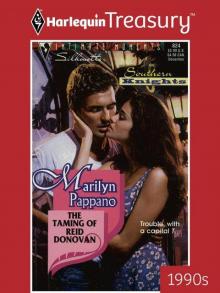- Home
- Pappano, Marilyn
Knight Errant Page 21
Knight Errant Read online
Page 21
“I’m still not offering anything, but you decided to resign anyway. How convenient. And just when did you make this decision?”
She hugged herself tightly, feeling a chill that had been absent only moments before. It came from his voice, from his anger, from his eyes. “Thursday. Smith said they would insist on removing me from the case for my unprofessional conduct. I told him I would resign the day the case ended if he could convince them to let me stay.”
He flinched at her choice of words. Unprofessional conduct . It was a cold, ugly phrase that had nothing in the world to do with the sweet passion they had shared. It didn’t belong anywhere in their relationship, but there it was, because of who and what she was.
Swallowing hard, she took a step forward. “Remember the other night, Nicholas? When you said that my background doesn’t matter? That it couldn’t affect the way you feel about me? That it couldn’t make you not want me?”
The look that crossed his face was exquisite in its sorrow. “I was wrong.”
His whisper hung between them, sending a shock through her. She had tried to prepare herself for this response, had acknowledged just how badly this whole mess could turn out, had even calculated that she had only one chance in four of coming out of it with her heart—meaning their relationship—intact. She must have lied to herself, though, because she wasn’t prepared. Deep inside she had believed he would understand and forgive. She loved him, and she had thought that he might love her, too, at least a little. She had believed that he would deal with this and still want her, need her, love her.
Gripping the iron footboard for support, she sank down on the mattress. “Seems I’m not the only one who’s been lying. I lied because my job involved staying close enough to keep you alive, and you lied because... Oh, yes. You wanted sex.”
For a long, long time, the room remained silent. Lainie stared at the floor, feeling as lost and weary as she ever had, and Nicholas seemed to be doing the same. All she could see in her peripheral vision was his feet, unmoving and still planted in the place where he’d backed away from her. Finally, in a voice that was flat and empty of life, he spoke. “Pack your bags and get out of here.”
Her fingers were numb, but she gripped the iron rail a little tighter. “If you send me away, they’ll just send someone else. Smith and Remy have no intention of sitting back and watching Falcone kill you.”
“I’d rather have someone else. I’d rather have anyone else but you.”
His words hurt, doubly so for the simple, emotionless manner in which they’d been spoken. She tried to ignore the pain and concentrate on what was important. “That can be arranged, but it’ll take time. In the meantime, you’re stuck with me.”
Finally he moved, and she lifted her gaze to watch him. He walked as far as the wide door that led into the living room, then looked back. “Was any of it true? Growing up in Savannah, your mother and father, your marriage—any of it?”
“All of it.”
“Right.” His skepticism was cold. “What about not being able to finish college because you couldn’t tolerate your father any longer? Or working as a waitress? Coming here to find something better? Choosing New Orleans because it was as far as your money would take you? Being short on cash when Karen offered you a job? Needing this apartment because you couldn’t afford a place of your own on what she paid? None of that was true, was it?”
She swallowed hard before guiltily admitting, “Just the waitress part.”
He stood there a moment longer, as if he needed to ask a few more questions. She would bet her heart she knew what they were. Was any of the rest of it real? The kisses? The hours we spent together? The lovemaking? Did you mean any of it? Did you care at all? Or was it all just part of your job? It was just as well that he didn’t ask, because right now, he wouldn’t be able to believe her answers.
When he finally turned away, she got to her feet and walked to the same spot where he’d just stood. “For whatever it’s worth, Nicholas, I never intended for any of this to happen. I never meant to fall in love with you, and I certainly never meant to hurt you.”
Her words stopped him for a moment in the doorway, his back to her. After a time, he glanced over his shoulder and gave her another of those sad looks. “Yeah,” he agreed, his voice distant and cold. “For whatever it’s worth.”
And then he was gone.
Lainie remained where she was until her feet began to ache and the muscles in her legs grew tight and tired. Finally she forced herself to turn back into the bedroom, to replace the pistol in its drawer, to return the backpack and the duffels to the closet. As she started to straighten the covers, she found the telephone there. She set it down just outside the front door, then went back to the bedroom, crawled into bed and curled up on her side.
He was angry—God knew, he had a right to be—but people got over being angry. When he recovered from the shock, when he calmed down and started thinking rationally, he would realize that what she’d done wasn’t so terribly different from his own actions. He had lied and pretended to be something he wasn’t in order to punish Falcone for Rena’s death, while she had done the same thing in order to prevent Falcone from causing Nicholas’s death. Surely he could understand the motivation and reasoning behind her actions.
But this wasn’t about understanding. It was about feelings. It was about trust and betrayal. In his lifetime, Nicholas probably hadn’t trusted more than a half-dozen people, but he had trusted her—more, he’d said, than anyone else in the world—and she had betrayed him. It didn’t matter that she hadn’t meant to or that she’d been trapped in a nowin situation. From the moment she’d met him, it had been too late to tell the truth and much too late to save herself from falling for him. But honorable intentions and desperate situations could never change the simple fact that she had betrayed him. He might never forgive her for it, and if he didn’t, she might never forgive herself.
Sunday was a bright, sunny day. It was the one day that O’Shea’s didn’t open its doors at all, a fact for which Nicholas would be grateful if he could summon up the emotion. After the night he’d just spent, though, he was a little low on things like gratitude. Happiness. Hopefulness. Forgiveness.
He hadn’t closed up last night until well past two, even though all the customers had gone home before midnight. He had stood behind the bar, doors propped wide, thinking morosely that it would be a perfect time for one of the drive-by shootings that gave Serenity its reputation. One of the resident punks could take mercy on him and put him out of his misery.
Of course it hadn’t happened, and it wouldn’t. Everyone on Serenity—probably everyone in southern Louisiana—knew that he was Jimmy’s. He was safer from the usual thieves and thugs than anyone else in the city, with the exception of Jimmy, because no criminal who wanted to continue living would ever interfere with Falcone’s revenge.
Of course, Nicholas thought with a bitter smile, if the old man found out the truth about Lainie, he would alter his revenge. There’d be no more late-night calls or visits, no more unsuspecting photographs, no more promises of death. No, he would leave Nicholas to live with his disillusionment. He would leave him to suffer the heartache of falling in love with the wrong woman.
No, not love. He didn’t love Lainie, no more than he’d believed last night that she loved him. He cared about her in the way that any man would care about the woman he was having an affair with, but he didn’t love her. His feelings for her were nothing compared to what he’d felt for Rena.
Even though he’d wanted to buy a house to share with Lainie. Even though he’d given too much thought to a future with her. Even though he’d caught himself a time or two watching Jamey with Karen and Sean and imagining himself with Lainie and a sweet baby with hazel eyes.
But none of that was proof of love. It was foolishness. Meaningless mental wanderings. Not wishes, not dreams, not destiny. Just an indication that he had too much time on his hands and too little going on in his life. Right?
/>
Right. And if he ever persuaded himself...
Pushing away from the window where he’d spent the last hour, he grabbed a T-shirt from the closet and pulled it over his head, then left the apartment. He hadn’t even managed to close the door, much less lock it, before the door across the hall opened.
A swift glanced showed that her night had been as restless as his own. Good. Since she was responsible for his problems, she should pay for them, too. He hoped she never finished paying.
He locked the door and pocketed the keys before facing her head-on. She was dressed, like him, in jeans and a T-shirt that fitted too snugly to allow for the concealment of anything, including that deadly little toy of hers. Of course, that was probably why she’d worn the waist pack every time they’d gone out. It hadn’t held the usual women’s stuff as she’d claimed but her pistol and the credentials she was required to carry whenever she carried the gun. All those times, he had walked beside her, sat across from her and held her in his arms, he had never guessed that she was armed, had never suspected that she was there to protect him. He had thought she was there because she liked him.
Idiot.
“Where are you going?”
Twenty-four hours ago he would have responded with a slow, lazy, kiss before issuing an invitation to bed. But twenty-four hours ago he had believed she was just Lainie Farrell, a little down on her luck but making the best of it. This morning he knew better.
“I’m going out—” He broke off, then asked, “What am I supposed to call you?”
“Nicholas—”
“Sorry. That name’s taken already. I can’t call you Lainie. That’s a little personal for an ex-con and a fed, don’t you think? How about Ms. Farrell? Or Special Agent Farrell?” His flippant remarks brought a layer of pain to her eyes that shamed him. He sobered and asked, “So what’s the routine here? Do I have to check in and out with you? Do I just tell you where I’m going, or do you have to actually follow me?”
“You shouldn’t go out alone.”
Shouldn’t, not couldn’t. But if he left without her, he had little doubt that she would follow or notify some other fed to do so. He could lose a tail, of course. He intended to head for the Quarter, where he knew every nook and cranny, every alley and back way. It would take better than the FBI’s finest to keep up with him there.
“I’ve been going out alone since I was six years old.” He managed to pass without touching her and started down the stairs. He was halfway through the bar when he heard her steps echoing behind him. By the time he reached the first intersection, she was only a dozen feet behind him. Closing his eyes, damning both her and himself, he waited for her to catch up.
They walked in silence to Decatur, then to Jackson Square and beyond. He tried to avoid looking at her, and he knew she was avoiding looking at him. He would have known if she’d ever raised her gaze from the ground. He would have felt it.
He did feel it when they cut across from St. Ann to St. Peter in front of the cathedral and she laid her hand on his arm. Because it felt too damn good, he didn’t shake her off or jerk free but let her fingers close around his forearm and pull him to a stop. He didn’t look at her, though. Instead he fixed his gaze on a lone musician behind her, entertaining a small crowd with an Irish ballad.
“I’m so sorry.”
He wanted to believe her, and maybe someday he would, but not today, not tomorrow, maybe not a long time after that. Not until he dealt with her deception. Not until he determined for himself just how much of these few weeks together had been real and how much had simply been Special Agent Farrell doing her job. He wanted to believe that pulling away from him, telling him no when she wanted—when he’d thought she wanted—to say yes had been business, while kissing him, coming to him and making love with him had all been personal. But he didn’t know. He had trusted her, and she had lied, and now he would have to find some new trust before taking her word for anything.
“Yeah, sure.” With a careless shrug, he turned and walked away, not looking back to see if she followed. He was past the entrance of Le Petit Théâtre when she caught up this time.
“I guess it was different—lying, pretending to be something else—when you were doing it with Falcone.”
He didn’t glance at her. “I didn’t sleep with Falcone.”
“You earned his trust and then betrayed it.”
“I tried to send the most powerful organized crime boss in the state of Louisiana to jail.”
“And I was trying to save your life.”
“My life is none of your damn business. I told Kendricks and Sinclair that I wasn’t interested in their offer of protection. I told them I would take my chances with Jimmy. It was none of your business.”
“When you testified against him, you made it our business.”
Abruptly Nicholas came to a stop, ignoring the tourists who had to step into the street to pass. He had assumed that Kendricks and Sinclair’s interest in keeping him alive had to do with gratitude and his twenty-five-year-ago relationship with Jolie. But, of course, they weren’t spending taxpayer money on sentimentality. Before he’d become a resident at the federal prison, he’d been a star witness in a federal courtroom. Witnesses against people like Jimmy Falcone were hard to come by, and Nicholas had been the best. If he died now, it would be one more powerful reason for other prospective witnesses to decline to take the stand.
Lainie wasn’t here to keep him alive because anyone gave a damn whether he died. She was here to protect the future interests of the government if they ever managed to take Jimmy to trial again. With the possible exception of Jolie, no one thought his life was worth saving. They just thought his death was worth preventing.
That hurt a little more.
She stood a few feet away, her gaze steady on him. “I’m sorry.”
“I bet you are. You screwed up on a regular basis since you took this case, and then you compounded it by telling Kendricks. Why the hell did you do that?”
“I had to,” she said stiffly. “My actions reflected badly on him and the bureau as well as on me. My errors in judgment—”
“So far, you’ve managed to refer to it as professional misconduct, actions that reflect badly on the government and errors in judgment.” Bitterness shaped his smile. “And here I thought it was just sex.”
Her eyes grew cloudy, and her smile was just as hurtful as his own. “And I thought it was something more. I guess we were both wrong.”
Suddenly he was more than hurt, more than bitter. He felt frustrated. Cheated. Mad as hell. “This whole mess was wrong from the start. They never should have sent you here. You never should have deceived me, and I never should have touched you. God help me, I never should have trusted you, and I won’t make the mistake of doing it again.”
“Nicholas, please—”
“Don’t quit your job, Lainie. Go back to Kendricks and tell him you lied. Plead with him, beg, hell, sleep with him if that’s what it takes—you’re pretty damn good at that—but hold on to your job because, darlin’, there’s nothing for you here. You try to stay on Serenity, and I swear, I’ll make your life hell.” Which was only fair, because her mere memory was going to make his life unbearable.
With that he turned and started walking, heading nowhere in particular, just away. Damn her dedication and damn her duty, she followed. He crossed the street between cars, cutting it close enough to make the driver blanch, then worked his way into a large group of college-age kids. He maneuvered in front of one with the shoulders of a linebacker, then, at the last instant, slipped through the open door of a smoky, dark bar. Without slowing his steps, he headed straight for the bathrooms at the back—and the hall that led to an alley exit—pausing only briefly to watch the last of the kids go by with Lainie only a few steps behind. She didn’t glance in the bar, but even if she had, she wouldn’t have seen him in all the gloom and shadows.
He waited a moment longer, then opened the unmarked door that led into the hall. Onc
e outside again, he stood in the narrow alley, at a loss. There was no place he wanted to go, no one he wanted to talk to. He could go somewhere for lunch, but he wasn’t hungry. It was more tempting to go right back inside for a drink, but the way he was feeling, he might not stop. He could go home, brood in his empty apartment and wait for Lainie to give up looking for him and return, or he could wander around the city and wait for a better idea to strike.
Somehow, he didn’t think he was going to get any better ideas for a long time.
Wondering why he’d left home in the first place, he headed that way again. When he got there, he found the bar locked up tight with the shutters closed. Even in her rush to catch up with him, Lainie had taken the time to secure the building. She was conscientious. Just as a good little FBI agent should be.
After he stepped into the dark bar and locked the door behind him, he leaned his forehead against the cool glass and groaned aloud. Here he had thought that maybe she’d been a hooker or an ex-con like him, maybe a nun or someone’s wife, a lot of little someones’ mother, but instead she was an FBI agent. He would have preferred any of the others over that... except the hooker. Or the wife. He didn’t want to think about Lainie with other men, particularly with another man who had more of a claim on her than he did.
But he didn’t have any claim on her. He was just her job, just a temporary assignment, spiced up with a little sex.
I thought it was something more.
He had thought so, too, but apparently he’d been wrong. More wrong than he could bear.
He went upstairs and took up his usual position at one of the windows. Time crept by with no sign of Lainie. When his hunger became too insistent to ignore, he ate a sandwich at the bar, then returned to the window, where he smoked enough cigarettes to force him to empty the ashtray. He had just stubbed out the last one in the place when the sound of a car drew his attention to the street. There weren’t many cars on Serenity. Most residents couldn’t pay the insurance or repairs on the only junkers they could afford, so they walked everywhere or relied on the city buses.

 Convincing Jamey
Convincing Jamey Knight Errant
Knight Errant The Taming Of Reid Donovan
The Taming Of Reid Donovan Criminal Deception
Criminal Deception